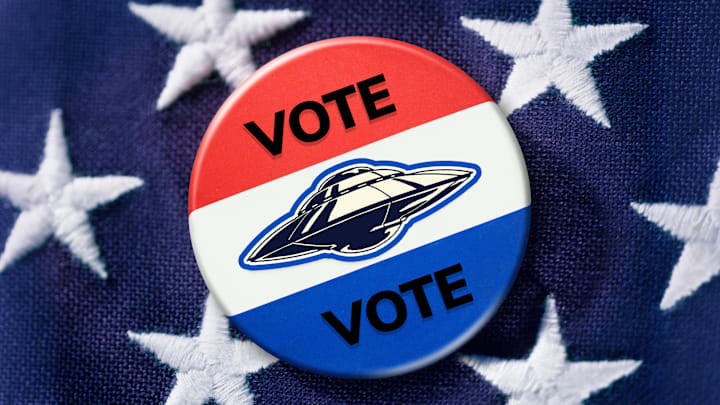In a speech before students of Houston’s Rice University in September 1962, President John F. Kennedy trumpeted his desire to aggressively pursue space exploration. Specifically, Kennedy set a goal of humans reaching the moon by the end of the decade.
“Why choose this as our goal?” Kennedy asked. “And they may well ask why climb the highest mountain? Why, 35 years ago, fly the Atlantic? Why does Rice play Texas? We choose to go to the moon.”
But Kennedy was not the only presidential candidate during the 1960 election to harbor ambitions of galactic importance. A man named Gabriel Green claimed to have traveled on flying saucers and been in contact with extraterrestrial beings. In fact, the aliens had specifically told him he should run for office.
“I’m running for president because I was asked to do so by emissaries from outer space,” Green said. And yes, he did appear to be quite serious.
Space Man
A former photographer for the Los Angeles Board of Education, Green, 35, was already president of the Amalgamated Flying Saucer Clubs of America. The devoted ufologist, who hailed from Whittier, California, claimed to have seen roughly 75 unidentified flying objects (a number that would later grow to 100) carrying aliens “who have been interfering [with humans] all along.” He announced his candidacy at the Biltmore Hotel in August 1960, which he explained was at the prodding of his alien cohorts.
The beings, Green said, were from the Alpha Centauri system and were human in appearance, albeit a towering 7 to 9 feet tall. They were also thankfully benevolent aliens, considering they possessed what Green described as the ability to completely conquer Earth in a matter of hours.
“They could completely take over this planet between breakfast and lunch any day of the year,” he said, “but that would be a violation of their principles.”
Instead, the aliens were purportedly content with acting as advisors for Green in his White House bid so humans could better understand their policies of peace and economics—policies, Green said, that had helped them achieve utopia on Mars, Saturn, and Venus. The aliens, he added, had tried to educate world leaders before, but their wisdom was ignored. It was now up to Green to enact the change the planet needed.
“A spaceman from Alpha Centauri came to my Los Angeles apartment a few months ago and talked me into throwing my hat in the ring,” Green said. “He didn’t have any name. Everybody knows spacemen don’t have names. We exchanged telepathic opinions, and then he spoke in English with an American accent.”
Green made it clear he had not actually been inside any advanced aircraft himself, only that he had met these beings and seen their mode of transport in action. His campaign manager, however, had been taken along as a passenger, where he observed a crew of six—four men and two women.
Why not just have an alien appear with him? Green dismissed the idea: “If he said he was from outer space nobody would believe him.”
Not that the aliens were necessarily above inter-species mingling. One, he later said, drove a Lincoln Continental with a view screen on the dashboard. Another posed as a “Beverly Hills domestic,” with a planet-to-planet commute of 30 minutes.
Green ran as an independent write-in candidate against Democrat Kennedy and Republican Richard Nixon, who was from Green’s hometown of Whittier. Green‘s campaign buttons read “Abe in 1860, Gabe in 1960” and “Flying Saucers Are Real.”
To the Outer Reaches
When it became clear American citizens had little concern for alien alliances in politics, Green withdrew his candidacy. When announcing the move in October 1960, he explained that “not enough Americans have yet seen flying saucers or talked to outer space people.” He threw his support behind Kennedy. Green estimated his support of JFK earned the Democratic candidate an additional 500,000 votes, though that number is probably up for debate.

Green would later claim that Kennedy had been visited by an alien named Renton, who had presumably made pleas for the president to implement alien strategies following Green’s defeat and even offered guidance on the Cuban Missile Crisis. It's not clear the president heeded his wisdom, whatever it may have been.
Green’s earnestness is hard to gauge. On one hand, his candidacy was announced the week of a major Los Angeles flying saucer convention and seemed an effective promotional tool for the gathering. On the other hand, his alien advocacy didn’t stop with the 1960 campaign. In 1962, Green reappeared, this time running for U.S. Senate and vowing to address nuclear war and communism. He did not appear to invoke his cabal of alien advisors, though he did earn 171,000 votes. But UFOs did come up when Green made a second presidential bid in 1972, this time on the Universal Party ticket.
“[O]ur party is attempting to offer the people of the United States an opportunity to become aware of the national and international problems with the aid of contacts with extraterrestrial beings,” he said. “If it is true that other worlds are more advanced than we, I think we can learn from them. I want to encourage people from other worlds to come forth and make themselves known.”
Green did not secure office, likely because he was on only one state ballot in Iowa. Instead, Richard Nixon was re-elected. In hindsight, maybe the aliens should have been given more of a chance.
